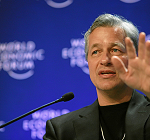A lot has transpired since. Jamie Dimon, chairman of the bank since 2006, admitted that the surprise loss would set back his campaign against tougher regulation of trading.
He agreed that the “buck stops with me,” meaning it was his ultimate responsibility for allowing a London-based trader nicknamed “the Whale” to violate the bank’s policy on trading risks. Several top officials of the bank, including Ina Drew, the woman who directly oversaw the traders, are stepping down. It’s still unclear whether Drew will have a “clawback” of some of her $15 million salary and bonus.
At an annual meeting in Tampa, Florida, well away from Wall Street, Dimon apologized to shareholders but was able to keep his $23 million in compensation and his two titles, chief executive and chairman. Some politicians suggested he should resign, but U.S. President Barack Obama called Dimon “one of the smartest bankers we’ve got.”
Washington’s bank regulators, the Securities and Exchange Commission, and several committees in Congress will investigate the trades. It’s worth noting that J.P.Morgan passed a Federal “stress test” for safety and soundness just months earlier so well it was allowed it to raise its dividend.
To Americans, this script is all too familiar. A bank “too big to fail” has a huge loss. It won’t break the bank this time, but if several banks experienced the same result close to each other, it could set off another 2008 financial panic. That would mean U.S. taxpayers would be expected to fund another bail out.
So the argument that the banks are safer does not hold in the public view, even if the regulators say they are. It was the full Washington establishment led by Federal Reserve Chairman Alan Greenspan and then board member Ben Bernanke who assured the world as late as 2006 that the financial system was self-regulating and safe. The financial press promoted their views without question. Then came the collapse.
The odds for some reform are better now. The U.S. Dodd-Frank law, passed over two years ago to prevent speculative trading by U.S. banks, was hardly considered stringent. But it’s been stalled as bank lobbyists worked to water it down further. Leading that campaign was Dimon, who said the regulation called for by the law was unnecessary. European bankers have also been trying to undercut trading regulation.
The Morgan debacle improves the chances for stronger regulation, but banks will still work to carve out loopholes to preserve some potentially profitable trading for themselves. Under the so-called Volcker rule which they opposed, named after former U.S. Federal Chairman Paul Volcker, banks would be permanently barred from trading for their own account, but allowed to hedge risks for customers as long as their positions were disclosed.
A better outcome for the public would be to have all trading and banking permanently separated, just as hedge funds are separated from banks today. Then if a high-risk trade blows up, the need for the government to bail out is much less, since the fund’s investors are the ones who get wiped out.
But for the world, the stakes are much broader. While many in Washington and Wall Street want to relegate the 2008 collapse to history, it’s clear international financial and government officials who were blindsided by the subprime crisis think a repeat is all too likely while the U.S. and Europe permit mega banks. At an International Monetary Fund conference of Indian and Chinese officials in New Delhi in March, the prevailing opinion was not whether there would be another financial crisis, but when – unless Europe and the U.S. enacted believable restriction on their banks. A meeting of the developing world’s BRICS group of Brazil, Russia, India, China and South Africa, debated setting up their own currency system to insulate themselves from another Wall Street collapse.
It’s taken a long time but an international backlash against the mega banks may be slowly building. Banks in London and Paris have been attacked by shareholders for excessive executive compensation and loss-making risk taking. The tide could manifest itself in calls for the size and scope for deposit-taking banks, especially if political parties in France and Germany move left.
Volcker and U.S. regulators have suggested limiting the size of government-insured deposit-taking banks to $100 billion in assets. Contrast that with the U.S. today, where J.P. Morgan at $1.7 trillion in assets is the largest, followed by Citibank, Wells Fargo and Bank of America. The four mega banks now control 60% of U.S. deposits, far more than before the crash because of bailout mergers and consolidations.
A leading regulator, Shelia Blair, the former head of the Federal Deposit Insurance Corporation, which insures bank deposits, wants a complete separation of banks and trading. “I just want all of this garbage out of insured banks” she says. “A bank should be making loans.” That separation still would not prevent Wall Street trading abuses, but without the banks financing them, speculators, hedge funds and private equity players wouldn’t be able to amass the gigantic leveraged positions that brought down the world financial system. U.S. mega banks still have a lot of political power with lawmakers. The next few months will show whether regulators will finally have the spine to stand up to them.
Bob Dowling is Editorial Advisor to Gateway House: Indian Council on Global Relations.
This article was exclusively written for Gateway House: Indian Council on Global Relations. You can read more exclusive content here.
For interview requests with the author, or for permission to republish, please contact outreach@gatewayhouse.in.
© Copyright 2012 Gateway House: Indian Council on Global Relations. All rights reserved. Any unauthorized copying or reproduction is strictly prohibited.


